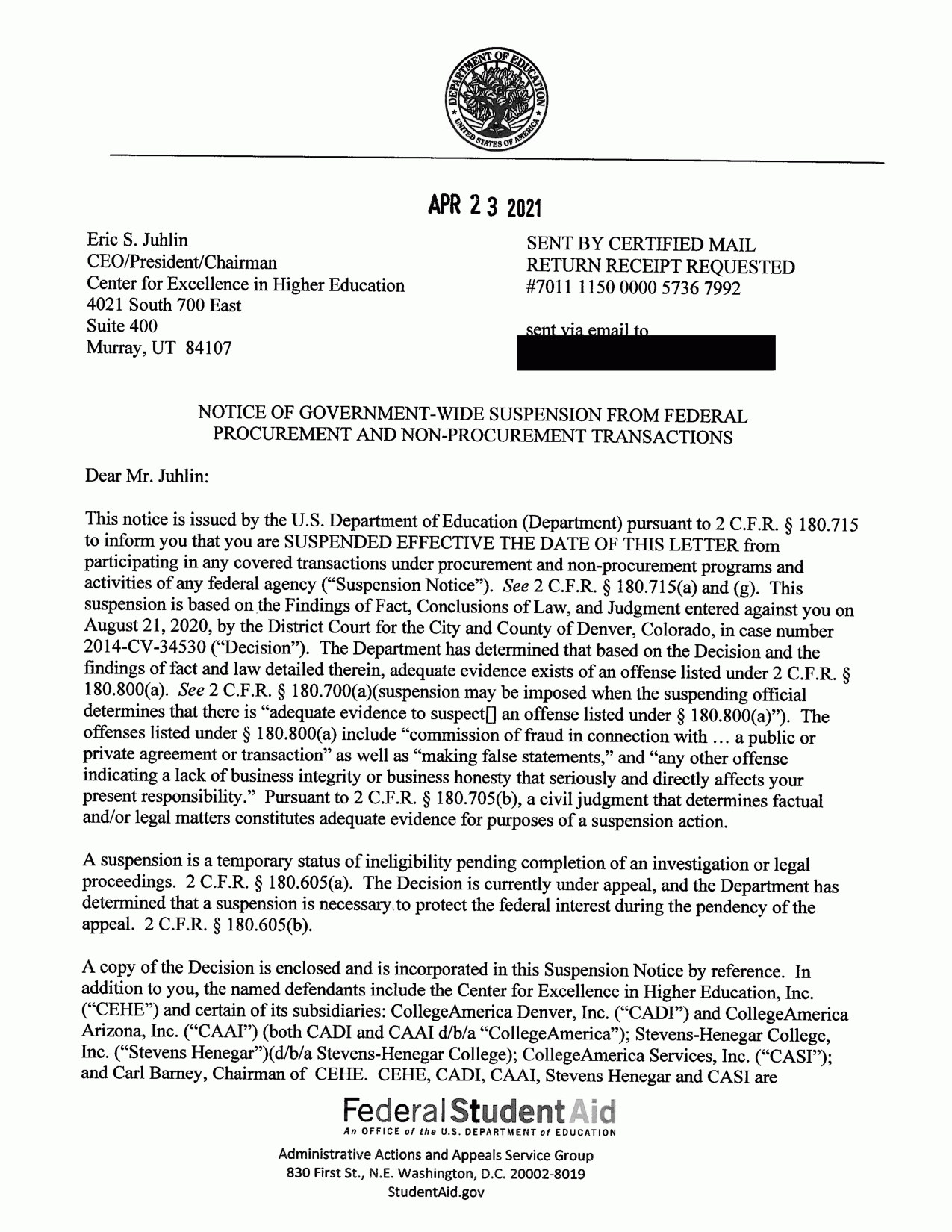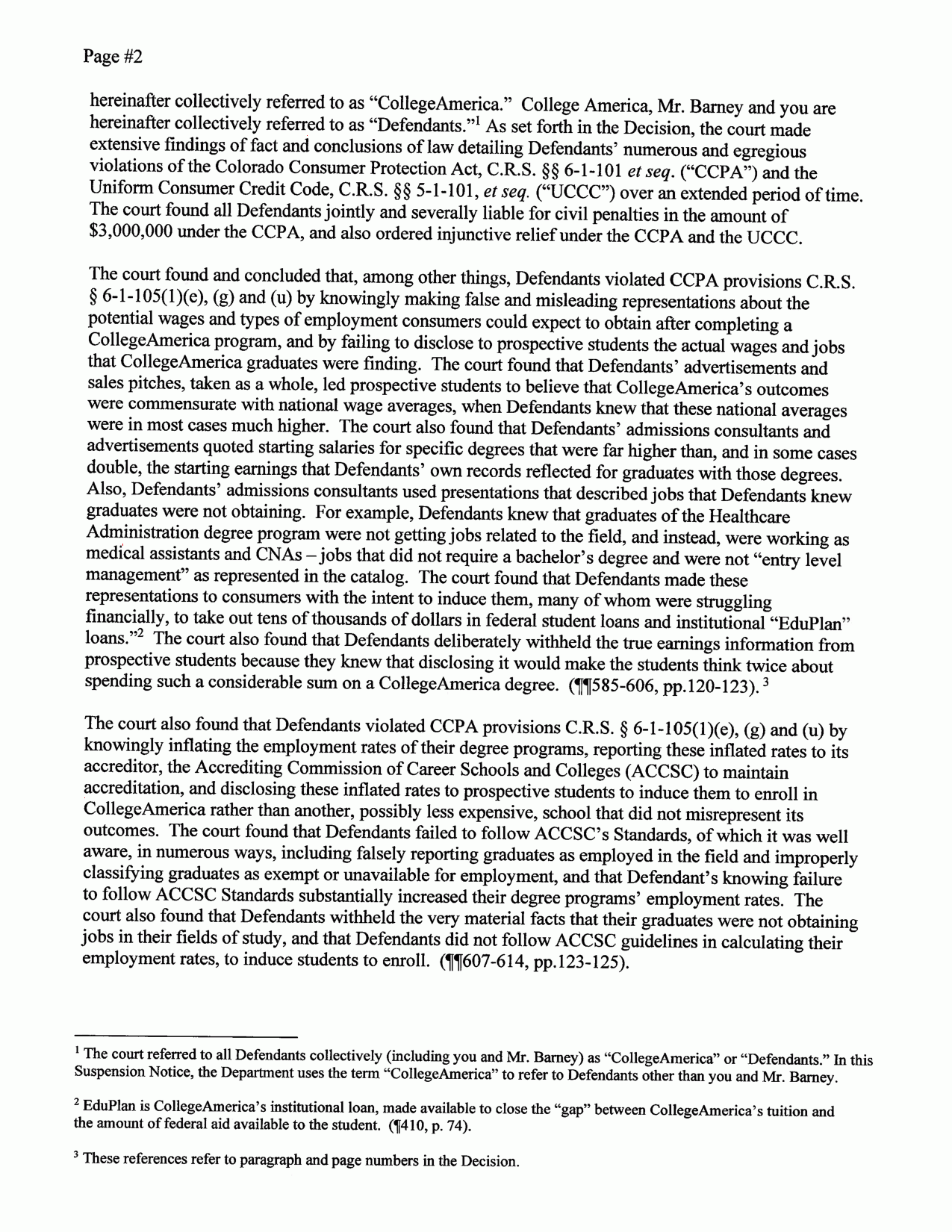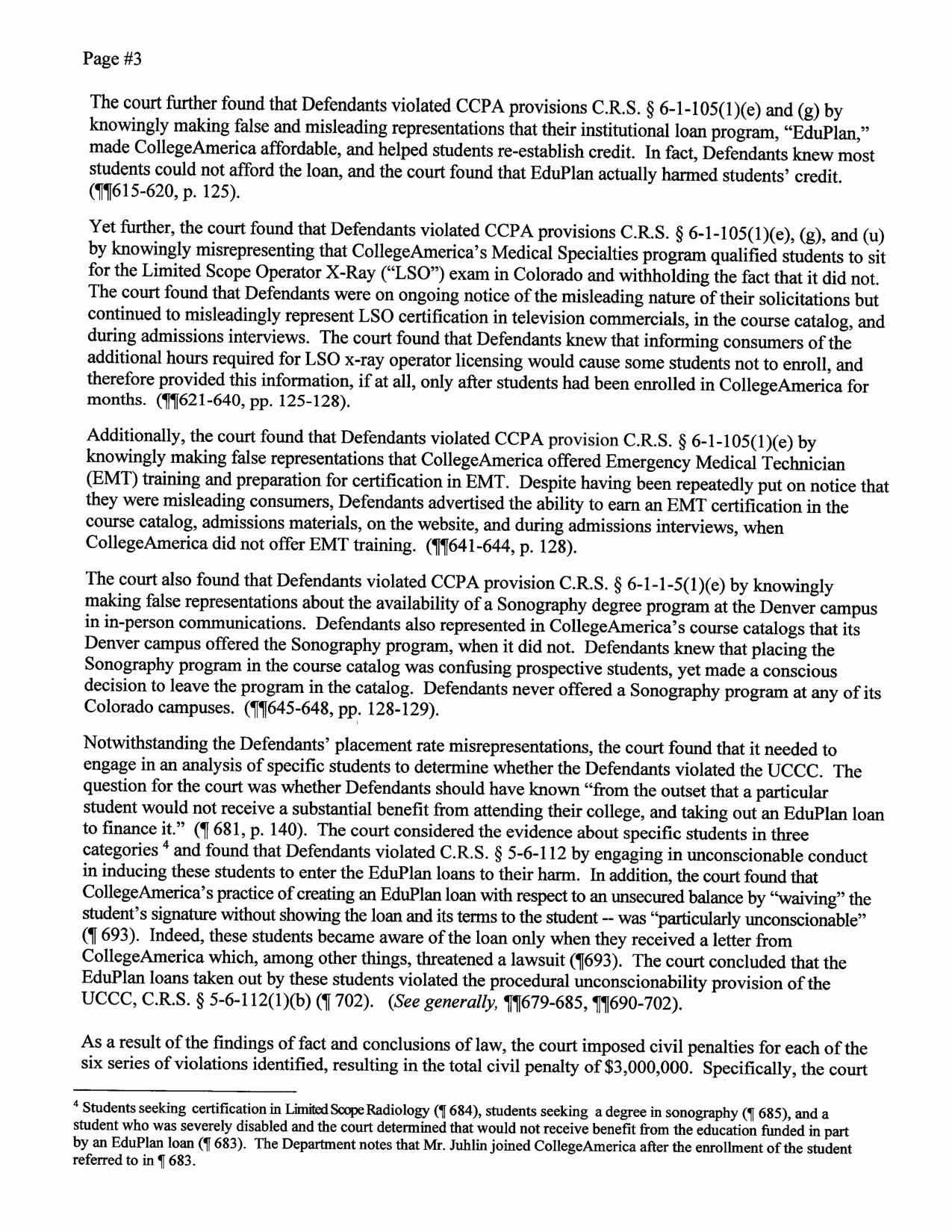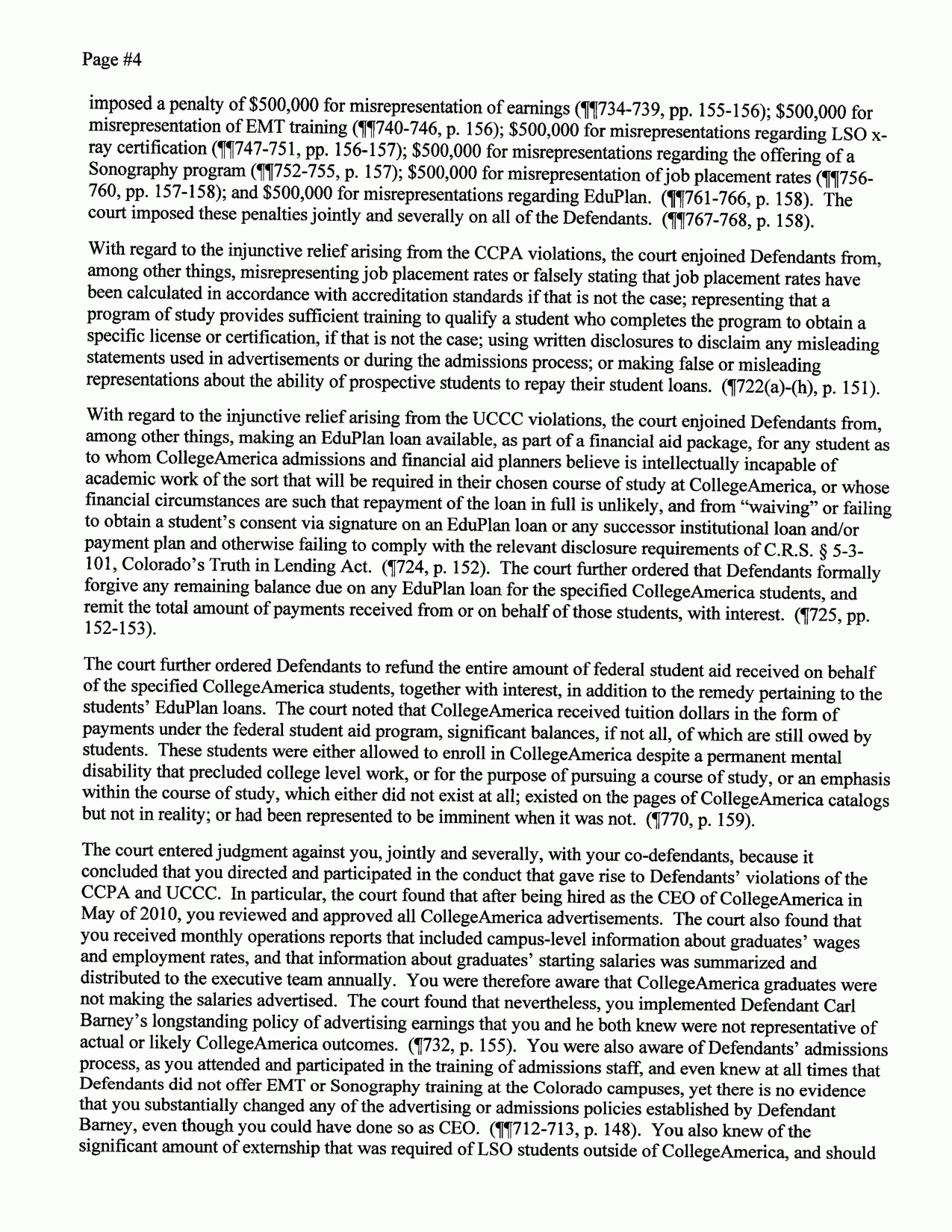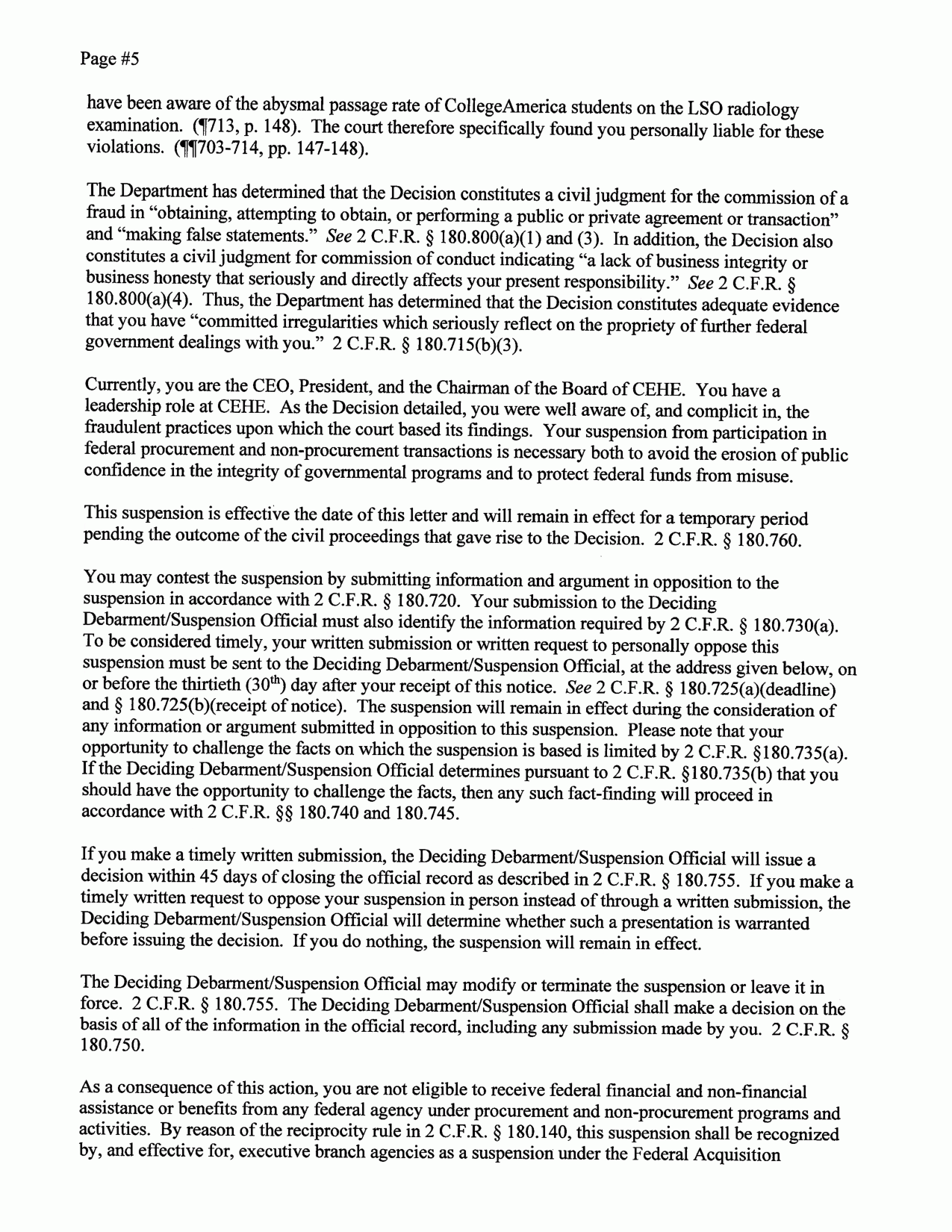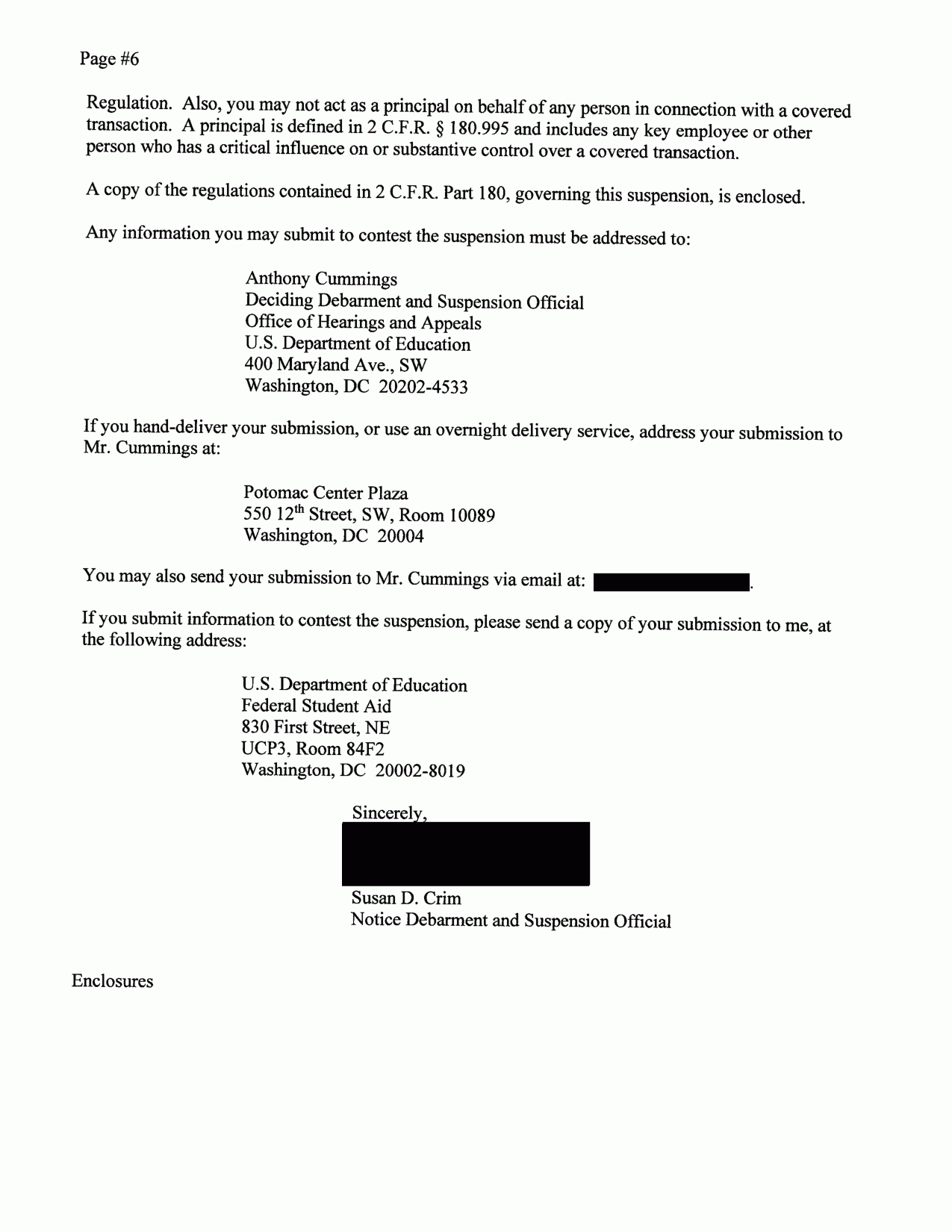<< ARI Watch
The End of Barney’s Second CareerCarl Barney’s first career was managing Scientology missions – you know, L. Ron Hubbard and squeeze the cans – swindling the gullible and ignorant. [1] His second career was managing for-profit colleges, taking advantage of the poorly overseen federal student loan program. He couldn’t lose. Help anyone with a pulse obtain a guaranteed loan to pay for one of his trade schools’ shabby degree programs, and he gets to keep the money whether or not the person defaults.
Lucrative as running Scientology missions had been, this new career was vastly more so. For all its faults, Scientology was never plugged into the federal handout machine. Over the course of twenty years or so, he amassed a fortune, hundreds of millions of dollars.
The beginning of the end of Barney’s second career can be traced back to late 2012, when he converted his for-profit colleges to non-profits. If Barney had remained for-profit, because of recently passed legislation going into effect, no more than 90% of his schools’ revenue could have come from federally guaranteed loans. Apparently 90% wasn’t enough for him. He avoided the restriction – or tried to – by converting to non-profit. (He claims the timing was purely coincidental. He says nothing about the conversion conflicting with his earlier praise of for-profit schools over non-profit ones.) The umbrella foundation for the newly designated non-profits was the Center for Excellence in Higher Education. For a time after this, Yaron Brook of the Ayn Rand Institute and Mr. Brook’s associate C. Bradley Thompson of Clemson University were on CEHE’s board of directors.
Highlights of subsequent events:
2013 February 11: The conversion from for-profit to non-profit draws the attention of investigative journalist and lawyer David Halperin. He begins writing about Barney and his schools, revealing that the schools continue to be run as if they were for-profit. In the first article he points to the high student loan default rates and quotes a letter from one employee describing the lack of integrity in recruiting: “Our admission representatives are required to enroll anyone and everyone. All entrance and diagnostic testing has been eliminated … Toothless and homeless people are not marketable and will never pay back student loans. We still enroll them. ... Our director said, ‘Get 40 people and I don’t care what you say or do to get them.’ ” [2]
2013 September 27: Two former employees file a whistleblower lawsuit against CEHE, claiming that the school had engaged in “a range of illegal and deceptive practices that defrauded U.S. taxpayers, who funded student grants and loans obtained by the school.” (Halperin) (For what it’s worth, [3] the following year the U.S. Justice Department agrees to join the lawsuit as to some of the whistleblowers’ claims.) [4]
2014 December 1: The Colorado attorney general (a Republican) files a lawsuit against CEHE, Carl Barney (chairman), and Eric Juhlin (CEO). The complaint claims that Barney’s CollegeAmerica misled students about the selectivity of the school, the transferability of credits, the jobs they could obtain and the salaries they could earn, systematically fleecing students and taxpayers. [5]
2015 March 2: The New York Times publishes an article about the for-profit to non-profit conversion, saying that Barney would acquire a lot of money as a result. Barney denies it. [6]
2016 August 11: The Education Department rejects CEHE’s application to be treated as a non-profit. Then-Secretary John King writes: “This should send a clear message to anyone who thinks converting to non-profit status is a way to avoid oversight while hanging onto the financial benefits: Don’t waste your time.” [7]
2016 August 30: CEHE files a lawsuit against the Department of Education accusing it of pursuing a political agenda.
2017 mid-October: The trial regarding the Colorado lawsuit begins in Denver District Court.
2018 December: Then-Education Secretary Betsy DeVos, whose top aide once served as a paid consultant to CEHE, reverses the decision of 2016 August 11 (see above). [8]
2018 December 19: CEHE withdraws its lawsuit of 2016 August 30 (see above).
2019 April 12: The federal Consumer Financial Protection Bureau, which tries to prevent abuses of private student loans, begins investigating CEHE. [9]
2019 May 2: The Accrediting Commission of Career Schools and Colleges (ACCSC) – a private organization recognized by the Dept. of Education – places CEHE on probation.
2020 August 21: The Denver District Court (see 2014 December 1 & 2017 mid-October above) finds that CEHE, CollegeAmerica, Stevens-Henager, Carl Barney, and Eric Juhlin violated the Colorado Consumer Protection Act, fining them $3 million and issuing an injunction against further infractions. [10] (Barney et al appealed the decision.) Not long afterwards Barney tries to prevent public access to the trial transcript. [11]
2021 April 22: By this time all of Barney’s brick and mortar schools are closed or in the process of closing, with only the entirely online school Independence University still functioning normally. Now the Accrediting Commission of Career Schools and Colleges (ACCSC) terminates Independence University’s accreditation. [12]
November 2020: CEHE produces a video titled “Town Hall with Your Host Eric Juhlin” and sent it to all CEHE employees. In it Juhlin denounces the recent Colorado decision against CEHE and the people who are attacking CEHE. This stands out:
“There are certainly individuals out there who are violently opposed to career education, to private enterprises operating colleges and universities. And any opportunity they can to seize upon something where they can criticize, they can try to advance their ideological agenda, they’re going to take advantage of that.”
In other words “they hate us for being good.” No, Barney – for this is Barney’s work – at least in this quarter we despise you for (1) pretending you are an “entrepreneur” and champion of the free market while you are almost entirely dependent – willingly and eagerly dependent – on cash from the state, and (2) getting rich cheating students and the state, the latter after the state’s theft from the taxpayer.
2021 April 23: The Department of Education suspends CEHE from participating in contracts or other programs of the federal government, including Title IV guaranteed loans, Pell and GI grants.
From the notice of suspension addressed to Eric Juhlin, Barney’s right-hand man:
“... you were well aware of, and complicit in, the fraudulent practices upon which the court based its findings. Your suspension from participation in federal procurement is necessary both to avoid the erosion of public confidence in the integrity of governmental programs and to protect federal funds from misuse.”
[12 again]
The notice of suspension contains a summary of the complaints against Barney and his schools. By this time Barney has stepped down as chairman of CEHE though still on the board of directors, calling himself chairman emeritus, and Juhlin is now chairman. Both Barney and Juhlin may have received the same letter; I only have a copy of the one to Juhlin:
2021 April 26: According to Barney, the Department of Education demanded to hear what had been done to ensure Juhlin’s departure.
2021 April 28: According to Barney, the Department of Education placed CEHE’s colleges on “Heightened Cash Monitoring 2,” which, again according to Barney, cut off all pending financial aid disbursements for current students. He says on his blog that this meant “No more money will come to CEHE.” (italicized in the original) Apparently his CEHE was totally dependent on federal aid.
2021 May: Juhlin is suspended from his CEO position. Because of the fraud verdict and subsequent DOE ruling (see 2020 August 21 and 2021 April 23 above) neither he nor Barney can administer the use of federal funds which existing students are using.
2021 July 1: Paul Gardner, interim CEO, sends a memo to employees in the Admissions Department saying “we will be unable to enroll new students for some time” and that CEHE must make staff reductions.
2021 July 19: The appeal hearing is held for ACCSC’s termination of accreditation (see 2021 April 22 above). They have 60 days to make a decision.
2021 July 20: Paul Gardner, interim CEO/CFO, writes employees that the U.S. government has not sent CEHE “any cash” since early May and that most staff will be terminated in 60 days. He tells employees not to advise students to withdraw at this point. Two days later David Halperin tweets: “Where in the world is Carl Barney? His office is telling various people that he is traveling, out of the county, away for a long time.”
2021 July 28: The registrar of Independence University emails employees: The school, per Eric Juhlin (who apparently is still running things despite being nominally gone), will close August 1st, but don't tell students yet. Students will be given options including transferring “to one of our teach out partners.” Employees who had been told their jobs would end September 18 now are told August 1.
2021 July 29: The Department of Education emails a letter to the CEO of CEHE as a
“follow up on our conversation earlier today where you confirmed that CEHE is closing all its locations effective August 1, 2021. ...
“... the information that we have received from students suggests that CEHE is not providing students complete information regarding all of the options available to them when an institution closes. As you are aware, when an institution closes, students who are attending the institution at the time of closure, and students who withdrew within a set time period prior to the closure, are eligible for a closed school loan discharge. ... students are not obligated to take a teach-out ... . ... To the extent CEHE has provided incomplete information to students about their options, CEHE must update and correct those communications immediately ...
“[We have] also learned that students are being pressured to agree to transfer to South University and Miami International University of Art and Design based on the agreement entered into between CEHE and those entities. ... [This arrangement] is not a typical teach-out agreement for anticipated school closures.”
The letter goes on to say that they are concerned
“about the terms of the arrangement which make it appear that the students will only have the choice of transferring to these institutions in order to continue their education. That is not an accurate representation of student options.”
And
“with what appears to be a sale of student enrollments to the teach-out/transfer entities. This is certainly not the purpose of a teach-out arrangement. Furthermore, this arrangement, which could position CEHE to profit from student transfers, heightens our concern about students not being advised of all options available to them.
“The Department has other serious concerns, including that the proposed transfer institutions may not currently offer all of the programs necessary to accommodate all of CEHE’s students. The Department is also concerned that there may be privacy issues with student information being transferred without full disclosure and consent of the students. It is also our understanding that the accreditor and state licensing bodies have not approved the arrangement, which is required. Based on all of these factors, the Department does not believe that the arrangement as currently written, is in the best interest of the students.”
The letter concludes by demanding that before this time tomorrow CEHE provide for its approval “a draft of an updated, accurate, and complete communication” for affected students, and that failure to do so may result in “alerting state Attorneys General of potential unfair, deceptive, and abusive acts and practices. ¶ The Department appreciates the full cooperation of CEHE to ensure that students have complete and accurate information, and to assist them in completing their education.”
It looks like Barney is trying to milk the system for every last dollar. In other words, business as usual.
2021 August 2: A class-action lawsuit is filed on behalf of employees claiming insufficient notice of termination, seeking wages covering the legal notice period.
2021 August 16: The chairman of the U.S. House Committee on Education and Labor sends the DOE a letter urging it to exercise its authority “to hold owners, executives, and board members of defunct for-profit and converted for-profit colleges individually responsible for liabilities of the institution to the federal government.” The letter mentions CEHE among several other institutions that had benefited from the Title IV federal loan program. The letter laments that it appears the DOE has never exercised this authority despite the for-profit college industry having “a long history of fraud” against students and taxpayers. That combined with the letter’s “being mindful of the ... statute of limitations” – which would apply to a substantial period in Barney’s case – suggests that Barney will get away with at least most of what had been judged fraud.
2021 August 26: The Court of Appeals decides that the Colorado Attorney General's Office needed to show that the marketing practices of CollegeAmerica were not only knowingly false and misleading but had a substantial public impact as well. It reverses the $3 million penalty and orders a new trial with a different judge. (See 2020 August 21 above.)
2021 August 26: Paul Gardner, interim CEO/CFO, writes employees. He blames the closure of CEHE on the DOE’s failure to act on CEHE’s “reimbursement request” of $29 million, also that the DOE is preventing it from liquidating certain assets, not on CEHE’s abuses and fraud discovered in the Colorado lawsuit (unmentioned in the letter). “As a result, CEHE does not have the funds to pay your retention bonus and severance payment at this time. ... Unfortunately, I cannot provide you with a date that process will be completed. I do not anticipate it will occur any time soon. ... ... filing a lawsuit to collect what is owed to you will not result in your being paid.”
Heaven forfend Barney should pay out of the hundreds of millions he’s walking away with.
2021 August 27: The Colorado Court of Appeals affirms the trial judge’s decision (see 2020 August 21 above) that CEHE violated the Uniform Consumer Credit Code by engaging in abusive practices in its high-interest “EduPlan” private student loans; it orders a new trial for an aspect of the Consumer Protection Act charges, saying the trial judge made an error. Quoting David Halperin:
“CEHE used some of your tax dollars to hire as its lawyer in the appeal one Sean Connelly, who formerly was a judge on the Colorado Court of Appeals, i.e., the court that heard the appeal. Barney and Juhlin, meanwhile, were represented by Gombos Leyton ...”
[13]
EduPlan loans are serviced by a company called AR Management.
[14]
Though the Court of Appeals decision is a combination of defeat and delay, on his blog Barney claims complete victory.
2021 September 17: Barney’s appeal of ACCSC’s termination of accreditation (see 2021 July 19 and 2021 April 22 above) is denied. Without accreditation Barney can no longer receive taxpayer money, and his business model depends on that money, if you can call it a business.
2021 September 27: Barney files a Notice of Intent to Arbitrate.
2021 mid-October: ACCSC sends the following Memorandum to DOE and “appropriate” agencies regarding “Public Notice of Commission Actions” (we omit our external quote marks):
WITHDRAWAL OF ACCREDITATION – PENDING ARBITRATION
The following institutions subject to a withdrawal of accreditation adverse accreditation action have provided to ACCSC a written Notice of Intent to Arbitrate ...
[Independence University, Stevens-Henager College (two locations)]
ACCSC withdrew the schools’ accreditation in a letter dated April 22, 2021. The schools appealed that decision but closed on August 1, 2021 before the ACCSC Appeals Panel issued its decision. The Appeals Panel upheld the Commission’s decision to withdraw accreditation in a letter September 17, 2021. The schools filed the Notice of Intent to Arbitrate on September 27, 2021.
... by applying for accreditation with the Accrediting Commission, a school agrees to exhaust all appeal opportunities and to submit fully and faithfully to the final, binding arbitration proceedings as set forth in the Standards of Accreditation before filing any suit, claim or proceeding relating to membership, accreditation, or accredited status.
... these schools remain accredited but on Probation during the pendency of the arbitration proceeding and until the arbitrator renders a final decision.
I’m reminded of the Chucky movies. I’ve only seen parts of a couple of them but know that Chucky, the villain, keeps coming back despite having been apparently destroyed at the end of the last movie.
2022 April 20: The U.S. District Court for Central Utah adjudicates CEHE’s appeal against the federal Bureau of Consumer Financial Protection’s Petition to Enforce Civil Investigative Demand (see 2019 April 12 above). The court found that the CID is within the authority of the Bureau, the information sought is reasonably relevant, the demand for it is not too indefinite; and enforcement would not constitute an abuse of process; however part of the CID is overly burdensome in that CEHE had already been required disclosure enough information.
“CEHE has now had multiple years to prepare witnesses for deposition and should not be unduly burdened to answer questionsregarding its own private-student-loan program.
...
“The undersigned recommends that the Petition be GRANTED as to information concerning CEHE’s private-student-loan program and be DENIED as to information regarding any previous litigation in which CEHE has been a party since 2012. The undersigned further recommends that CEHE be ORDERED to submit to the Bureau’s CID within 30 days.”
Now we know for sure that CEHE was operating its own loan program instead of always leaving the loan decision and interest to an outside bank.
[15]2022 August 11: The arbitration the ACCSC mentioned in its last memorandum (see 2021 mid-October above) is completed and the ACCSC sends a second memorandum to “Department of Education, Appropriate State Agencies, and Appropriate Accrediting Agencies” with the subject: “Public Notice of Commission Actions”:
| WITHDRAWAL OF ACCREDITATION – FINAL ACTION |
| School | City, State | Status |
| Independence University | West Haven, UT | Withdrawal of Accreditation – Final Action |
| Stevens-Henager College | Murray, UT | Withdrawal of Accreditation – Final Action |
| Stevens-Henager College | Boise, ID | Withdrawal of Accreditation – Final Action |
None of these schools’ websites mentions their loss of accreditation. Instead each says the school
“has made the difficult decision to close our doors.”
: In Virginia federal district court CEHE sues to overturn the arbitration decision upholding ACCSC’s revocation of accreditation.
Also, both CEHE and the Colorado attorney general appeal aspects of the state lawsuit to the Colorado Supreme Court., The U.S. Justice Department is still moving ahead with a lawsuit joined with whistleblowers in former False Claims Act fraud charges against CEHE. And the federal Consumer Financial Protection Bureau is still pursuing a separate investigation into CEHE’s former private loan practices.
2022 November 22: Self-righteous as ever, CEHE
/
Barney sues the United States of America in the U.S. Court of Federal Claims, seeking the return of $50 million held in escrow, plus interest, and $500 million – half a billion dollars – for the destruction (“cripple and close,” quoting the press release by Eric Juhlin) of its
/
his colleges and lost revenue. Actually his schools’ loss of accreditation was a private matter and Barney himself closed his schools after the government withdrew federal aid, apparently realizing he could not make money without such aid. He seems to equate “withdrawing federal aid” with “crippling and closing.”
2023 April 21: Barney, on his blog, says that the downfall of CEHE was the result of an orchestrated campaign conducted by malicious people, beginning with anonymous letters sent to ACCSC from 2012 to 2017. “Prior to this time, there had not been a single anonymous smear/complaint against CEHE’s colleges.” Setting aside “smear” – a complaint need not be a smear – this simply isn’t true. The Internet has many Yelp-like websites for colleges. During and before the period Barney cites, CEHE colleges received many very negative reviews.
[16] In this it looks like Barney is no more truthful about CEHE than he is about the Church of Scientology.
[1 again]2023 May 15: The Colorado Supreme Court rejects CEHE’s final appeal of the three million dollar fine issued on 2020 August 21 (see above) and its request for a retrial. David Halperin: “... Center for Excellence in Higher Education ... lost on nearly every issue today in a decision issued by the Colorado Supreme Court.” And concluded: “Now I guess Carl Barney can add the Colorado Supreme Court to his list of conspirators.”
[17]2023 July: The Education Department cancels $130 million in federal loan debt of former CEHE students, “citing school misconduct” as reported by David Halperin. If I understand this, U.S. taxpayers pay the debt, Barney returns nothing.
2023 December 11: The Education Department demands $23 million from CEHE as a result of “approved Direct Loan closed school applications ... .”
[18]2025 January: The Department of Education grants 1.15 billion dollars in debt cancellation to 73,600 borrowers who attended CEHE schools between 2006 and the chain’s collapse in 2021. The DOE said this was done “based on findings that CEHE engaged in widespread and pervasive misrepresentations related to salaries, employment prospects, and its private loan product.” In David Halperin’s report on this there is no mention of Barney being made to return part of the loans; it looks like the taxpayers pay the 1.15 billion.
2025 April: The whistleblower and now DOJ lawsuit (see 2013 September 27 above) finally goes to trial, with the DOJ in charge. Before the trial the presiding judge barred the whistleblowers’ lawyers from pursuing some of the claims and dismissed some of the government’s claims until at trial the case has been narrowed down to one not-too-much-burger question: Did Stevens-Henager College violate the Department of Education’s “incentive compensation ban,” which bars compensation tied to student enrollments. As the judge put it, whether the school “knew that [its policy] violated the ICB yet continued to award bonuses under it anyway” (which sounds a lot like ignorance of the law is an excuse) and whether the DOE, when it continued to give the school federal aid, relied on CEHE’s promise to obey the law (which sounds a lot like the law needn’t matter). The jury found in favor of CEHE.
Thus Barney’s second career comes to an end. But not to worry! Barney now has a third career, as the power behind the wanna-be successor to the moribund Ayn Rand Institute, Craig Biddle’s Objective Standard Institute. Update: Barney is trying to disassociate from OSI, contesting an agreement for future donations and trying to get unspent past donations returned. [19]
1 At first Barney was evasive about his Scientology career, then when it was fully exposed he became self-righteously unrepentant. See Barney’s Big Lie and other articles on this website.
2 “If a For-Profit College Becomes a Non-Profit, Is That Good? Not Necessarily”
by David Halperin, Republic Report 11 February 2013
republicreport.org/2013/for-profit-colleges-convert-non-profit
On the occasion of a whistleblower lawsuit finally brought to trial in 2025, Halperin writes:‘Carl Barney owned a school chain that included the CollegeAmerica, Stevens-Henager, and Independence University brands. In 2012, he sold the operation to the Center for Excellence Higher Education, a non-profit organization he had recently taken over ... Barney loaned CEHE $431 million to finance the sale, based on a puzzling $419 million valuation of the schools’ ‘intangible assets,’ such as its reputation. CEHE was then obligated to repay its debt to Barney, along with millions in rent he charged for the schools to use his buildings. The schools ultimately took in more than a billion in taxpayer dollars, and much of that money went straight into Barney’s wallet.”
“In a September post on his personal website, Barney explained that he liked that Trump “wants to work with Elon Musk to reduce spending, regulations, waste, and fraud in the federal government.’
“... the irony is apparent: His school operation has been rightly accused by multiple law enforcement and oversight bodies of itself engaging in blatant fraud or other misconduct with taxpayer dollars.”
by David Halperin, Republic Report 29 April 2025
republicreport.org/2025/he-gave-1-million-to-elect-trump-the-justice-dept-just-took-his-for-profit-college-to-trial-for-fraud-and-lost
3 It isn’t worth much considering the DOJ’s long history of corruption. See the work of Rodney Stich, the presidential term of Donald Trump, or just the last election, better described as a coup. However it must be said, it’s an ill wind that blows nobody good: at least the faux president got rid of Betsy DeVos.
4 “Katie Brooks, Nannette Wride, and the United States vs. Carl Barney et al”
ARIwatch.com/ComplaintAgainstBarney-BrooksWrideUS.htm
5 Though filed on 1 December 2014 the decision was sealed (not public). It was unsealed 17 February 2015.
“Colorado vs. Carl Barney et al”
ARIwatch.com/ComplaintAgainstBarney-Colorado.htm
6 “Some Owners of Private Colleges Turn a Tidy Profit by Going Nonprofit”
by Patricia Cohen, The New York Times 2 March 2015
nytimes.com/2015/03/03/business/some-private-colleges-turn-a-tidy-profit-by-going-nonprofit.html
(Barney’s case is near the end of the article. The subject is also mentioned in the reference cited in footnote 8.)
7 “Education Department Denies Request for Chain of For-Profit Colleges to Convert to Non-Profit Status”
U.S Department of Education, 11 August 2016
ed.gov/news/press-releases/education-department-denies-request-chain-profit-colleges-convert-non-profit-status
For what it’s worth (the author is associated with political hacks in the Democratic Party but seems to be an honest reporter):“Barney had taken control of a mostly defunct but already-IRS-approved nonprofit, the Center for Excellence in Higher Education (CEHE), and arranged for it to sign promissory notes for his for-profit schools. ... the approach cloaked hoped-for future streams of profit in the guise of rent and loan payment obligations from the nonprofit entity—which he continued to control through surrogates. ... After investigating, the department denied CEHE’s request to be treated as nonprofit school operator (under the agency’s programs).”
by Robert Shireman, The Century Foundation, 7 October 2020
tcf.org/content/report/how-for-profits-masquerade-as-nonprofit-colleges
8 The existence of CEHE’s December 2018 agreement with the Trump administration wasn’t made public until April 2020.
“How a For-Profit Tycoon Turned His Colleges Into Nonprofits”
by Dan Bauman and Michael Vasquez, The Chronicle of Higher Education April 12, 2020
chronicle.com/article/how-a-for-profit-tycoon-turned-his-colleges-into-nonprofits
9 “CFPB Launches Investigation Against College Chain Owner”
The College Post 2 October 2019
thecollegepost.com/college-chain-federal-investigation
10 “Colorado Court Slaps Carl Barney Colleges With $3 Million Fraud Verdict”
by David Halperin, Republic Report 21 August 2020
republicreport.org/2020/big-win-for-students-colorado-court-slaps-carl-barney-colleges-with-3-million-fraud-verdict
(Contains a link to the court decision and order.)
From a letter by three U.S. senators to the Department of Education, 2 August 2021 (we leave off our external quote marks):On August 21, 2020, a Colorado state court found that CEHE defrauded students and violated Colorado’s consumer protection law. CEHE’s Chairman Emeritus Carl Barney and CEO Eric Juhlin were found individually liable.
[*] The court identified that institutions run by CEHE used deceptive trade practices to make “false and misleading representations about the potential wages and types of employment” a student could expect after completing a program at these institutions.
[§585] Further, the court identified that between 71 percent and 81percent of students attending CollegeAmerica in Colorado were receiving financial aid through Title IV.
[§409] Examples of the kinds of fraud identified by the court included: advertising potential wages twice that of CEHE graduates,
[§585] intentionally withholding data showing CEHE graduates earnings were lower than national averages,
[§§641-648] and advertised programs such as training for X-Ray Technicians, which would not be acceptable for a state licensing exam, or a sonography program that never existed.
[§607]
*
Colorado v Center for Excellence in Higher Education, 14cv34530, Finding of Fact, Conclusions of Law, and Judgement (hereinafter, “Order”), filed Aug, 21, 20120, available at
republicreport.org/wp-content/uploads/2020/08/FINDINGS-OF-FACT-CONCLUSIONS-OF-LAW-AND-JUDGMENT.pdf
republicreport.org/wp-content/uploads/2020/10/10.14.20_Coalition-CEHE-Ltr-to-DeVos.pdf
11 “Independence University Operator Seeks to Conceal Record of Trial it Lost”
by David Halperin, Republic Report 5 March 2021
republicreport.org/2021/independence-university-operator-seeks-to-conceal-record-of-trial-it-lost
12 “Citing Performance Failures, Accreditor Dumps Independence University”
by David Halperin, Republic Report 23 April 2021
republicreport.org/2021/breaking-citing-performance-failures-accreditor-dumps-independence-university
An excellent review of events up to this time:
“Chasing Carl Barney: My 7-Year Fight for Student Justice and Corporate Accountability”
by Debbi Potts, Higher Education Inquirer January 15, 2021
highereducationinquirer.org/2021/01/chasing-carl-barney-debbi-potts.html
13 “Shuttered CEHE College Chain Gets Mixed Appeals Verdict”
by David Halperin, Republic Report 27 August 2021
republicreport.org/2021/shuttered-cehe-college-chain-gets-mixed-appeals-verdict
14 The following is from the Financial Information section of the catalog for Independence University, 2011-2-12:“AR Management: This is an institutional program. We encourage students to apply for private loans through Sallie Mae or a selected bank. If financed through AR Management, the first payment is due on the first day of the second month following enrollment. Interest charged is the same rate as charged on Stafford Loans with a minimum of 7%. If students make payments pursuant to an installment plan, a separate installment contract will be entered.”
15 Why let a bank reap the interest on the loans? With “EduPlan,” whose loans are serviced by a business entity called AR Management, CEHE lends the money (effectively to itself) and collects the interest. AR Management (who knows what the AR stands for but one can guess) is reminiscent of Scientology Coordinated Services of Barney’s first career; see Who Is Carl Barney on this website.
16 For examples see Response to Barney Revelations near the end.
17 “Collapsed Career College Chain CEHE Loses at Colorado Supreme Court”
by David Halperin, Republic Report 15 May 2023
republicreport.org/2023/collapsed-career-college-chain-cehe-loses-at-colorado-supreme-court
18 “Education Department puts CEHE on the hook for $23M in closed-school loan discharges ”
by Natalie Schwartz, Higher Ed Dive 18 Dec. 2023
highereddive.com/news/education-department-cehe-closed-school-discharges/702893
And
“Predatory Colleges, Converted to Non-Profit, Are Failing”
by David Halperin, Republic Report 2 January 2024
republicreport.org/2024/predatory-colleges-converted-to-non-profit-are-failing
From the relevant section (leaving off our external quote marks):Last month, the Department of Education took another step to hold accountable the non-profit Center for Excellence in Higher Education, whose schools, the largest of which was Independence University, shut down in 2021. The Department demanded $23 million from CEHE to pay for “closed-school discharges” – reimbursement for cancellation of federal student loan debts that former students had owed the government. The Department in July already had cancelled $130 million in federal loan debt from former CEHE students, citing school misconduct; the Department could potentially seek to recoup all those funds from CEHE.
...
... CEHE’s abuses were by no means limited to the terms of the non-profit conversion. In 2020, a Colorado court found the company had engaged in systematic deceptive practices. Barney’s schools, the court concluded after an extensive trial, used a detailed playbook to manipulate vulnerable students into enrolling in high-priced, low-quality programs; directed admissions representatives to “enroll every student,” regardless of whether the student would likely graduate; greatly overstated starting salaries that graduates could earn; and falsely inflated graduation rates. CEHE has been pursuing an appeal, but in 2021, the accrediting agency for the schools withdrew approval, citing performance failures, and the Department of Education soon after tightened the screws on federal aid, precipitating the schools’ closure.
[CEHE] no longer runs any schools or gets any federal aid; instead its functions seem to be limited to trying to get former students to pay back the sketchy, high-interest private loans the school peddled, and engaging in legal disputes with the federal government; these include a pending fraud lawsuit filed by a CEHE whistleblower and joined by the Justice Department, an investigation of CEHE’s private loans by the Consumer Financial Protection Bureau, and a lawsuit for $500 million brought by CEHE against the government ...
19 See OSI vs. ARI.
